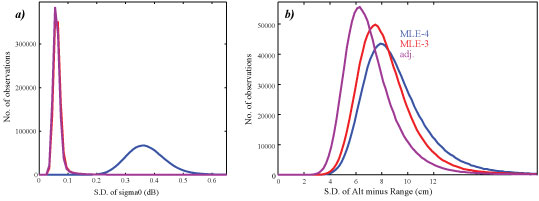Abstract's details
Better than Averaging : Empirical correction for Intra-1Hz correlations
Event: 2018 Ocean Surface Topography Science Team Meeting
Session: Instrument Processing: Measurement and Retracking
Presentation type: Oral
It has long been noted that high-frequency correlations exist between the various parameters output by a retracking algorithm, due to a connected response to particular realizations of speckle noise or due to inaccuracies in the assumptions the algorithms are based on. These correlations are easily obtained by examining the multiple parameter fits within a 1-second ensemble. We illustrate here with the association between sigma0 and mispointing (both sensitive to shape of the tail of an oceanic waveform) and between range and significant wave height (responding to deviations on the leading edge). Corrections are dependent upon altimeter and retracker employed. For the MLE-4 retracker applied to data from the Jason series of satellites, the correction to sigma0 removes more than 90% of the small-scale variability, but also has effects well beyond the 1-second analysis window, with improvements in the match between Jason-2 and Jason-3 at scales up to 50 km. Thus the impact at these scales is superior to simply block averaging the data to reduce uncertainties. Similarly, a correction for wave height reduces the variance within its 1 Hz range measurements by 38%, with improvements at all scales out to 50 km. We hope to be able to demonstrate increased agreement of Sentinel-3A and Sentinel-3B during their tandem phase.
The figure shows the reduction in short-scale (intra-1 Hz) variability for Jason-3 data upon application of the adjustment to MLE-4 data. a) Sigma0 data, b) Altitude minus range

Back to the list of abstractThe figure shows the reduction in short-scale (intra-1 Hz) variability for Jason-3 data upon application of the adjustment to MLE-4 data. a) Sigma0 data, b) Altitude minus range
